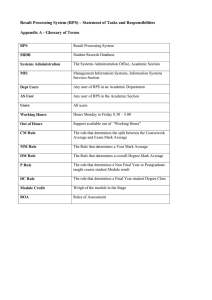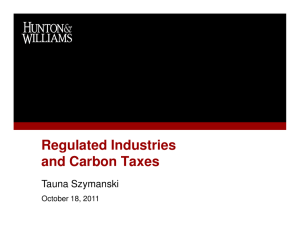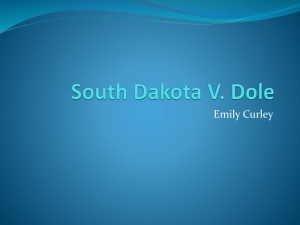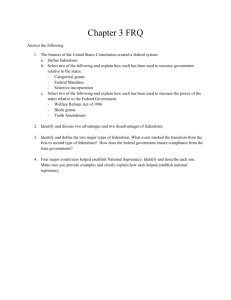States on Steroids: The Continuing American Climate Odyssey
advertisement
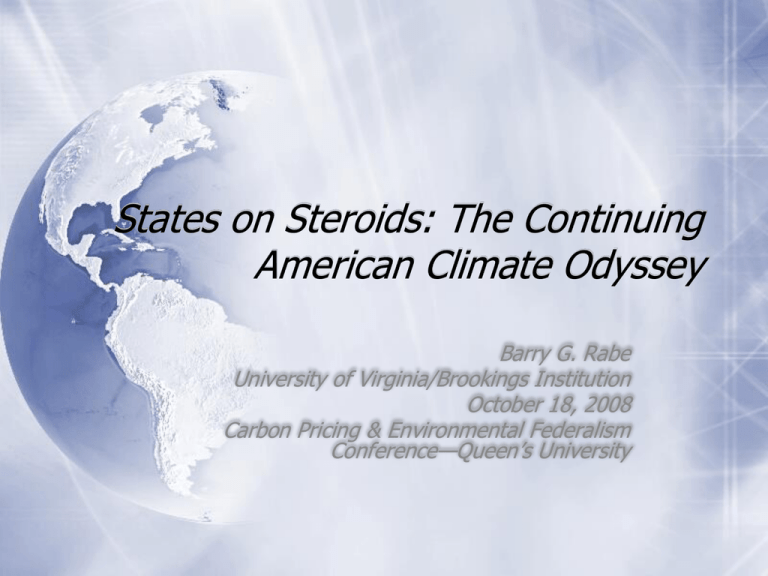
States on Steroids: The Continuing American Climate Odyssey Barry G. Rabe University of Virginia/Brookings Institution October 18, 2008 Carbon Pricing & Environmental Federalism Conference—Queen’s University The Conventional Wisdom about American Climate Policy Post-Kyoto, America the EVIL EMPIRE Post 2008 election, All will Change Signs that Rip Van Winkle is Awakening in Washington Courts are handing down decisions EPA is blocking state action 2005, 2007 Energy bills PACKED with incentives and subsidies for every form of energy Congress is talking—a lot h (1 97 519 95 76 th ) (1 97 719 96 78 th ) (1 97 919 97 80 th ) (1 98 119 98 82 th ) (1 98 319 99 84 th ) (1 98 510 19 0t 86 h ) (1 98 710 19 1s 88 t( ) 19 89 10 -1 99 2n 0) d (1 99 110 19 3r 92 d ) (1 99 310 19 4t 94 h ) (1 99 5 -1 10 99 5t 6) h (1 99 710 19 6t 98 h ) (1 99 910 20 7t 00 h ) (2 00 110 20 8t 02 h ) (2 00 310 20 9t 04 h ) (2 00 5 -2 11 00 0t 6) h (2 00 720 08 ) 94 t Congressional Hearings on Environmental Policy 160 148 140 120 100 80 60 40 20 17 24 5 2 2 2 1 20 17 24 16 8 12 9 14 2 0 But the real action remains in the statehouses Renewable Portfolio Standards Cap-and-Trade Programs Endorse California Waiver on Vehicles Public Benefit Funds Governors as Climate Superheroes Renewable Portfolio Standards Regional Initiatives Vehicle Greenhouse Gas Emissions Standards Public Benefit Funds Lessons from the States Framing allows tailored strategies: -Localized climate concerns -Localized economic development opportunities -Localized concerns about energy costs/reliability Potential advantages from early-action Potential rent-seeking opportunities Credit-claim and blame avoidance converge (2050?) -Agency entrepreneurs yield to large coalitions More Lessons from the States Policy adoption inverse to expert opinion Everybody loves regulation (RPS can be sold anywhere) Cap-and-trade occupies a middle ground Carbon taxes off-limits, except in stealth form (PBF) States generally providing the blend of policies the public wants The Day After Enactment: Can Climate Policy be Implemented Conventional Wisdom: Market-based policies self-implement once pols have courage (Sulfur dioxide) Experience to date: Vastly more complex, even when political will and administrative capacity are high Missed deadlines Missed targets Administrative conflict/chaos Constant threat of litigation Cap-and-Trade: Tales of RGGI Optimal circumstances: Broad political support and unusual partnering between environment and energy ministries Experience: Four years of hard negotiations Offsets, Safety-Valves, Auctioning , Rebates all REMAIN contentious The real issue of leakage The lack of FIT with other programs (RPS) The periodic threat of secession RPS: The Good, Bad & Ugly Some big success stories: Texas Some big problems: Hubris (California) Defining renewables (Pennsylvania) Hoarding benefits within state Greater costs/Fewer benefits Siting and NIMBY concerns (Massachusetts) Transmission Warfare among proponents of various renewables Carbon Taxes The Consensus among Policy Wonks The pressure to CUT gasoline taxes Framing: Public Benefits Funds/Social Benefit Charges The Chris Dodd Profile in Courage Award Trying to do it ALL: California Politicians of all parties/units racing to top to be a WORLD CLIMATE LEADER California trying to do everything—sans carbon tax Huge implementation challenges Competing agencies (CARB, CEPA, CEC, CPUC…) Push-back against cap-and-trade (“More Wall St…”) Limited ability to control neighbors Policies lose allure as costs increase/deadlines near The 44th President and the 111th Congress Can Climate Compete Against Other Issues? Can Congress Govern the Climate? Can EPA Govern the Climate? Can we create new Climate Institutions (ironically, using Federal Reserve Board as a model)? And what about Federalism? Half a nation: Actively engaged Half a nation: Essentially disengaged American federalism: Badly broken, now more than ever Table 1. State Climate Policy Adoption and Greenhouse Gas Emission Trends Emission Growth Trends (1990-2005) High (>16%) High 12-20 policies Levels of State Climate Policy Adoption Low 0-11 policies Arizona Colorado Illinois Iowa Maine Maryland Minnesota Montana Nevada Alabama Alaska Arkansas Florida Georgia Idaho Mississippi Missouri Nebraska New Hampshire New Jersey Oregon Rhode Island Utah Vermont Washington Wisconsin North Carolina North Dakota Oklahoma South Carolina Tennessee Virginia Low (<16%) California Connecticut Delaware Hawaii Massachusetts New Mexico New York Pennsylvania Texas District of Columbia Indiana Kentucky Louisiana Michigan Ohio South Dakota West Virginia Wyoming

